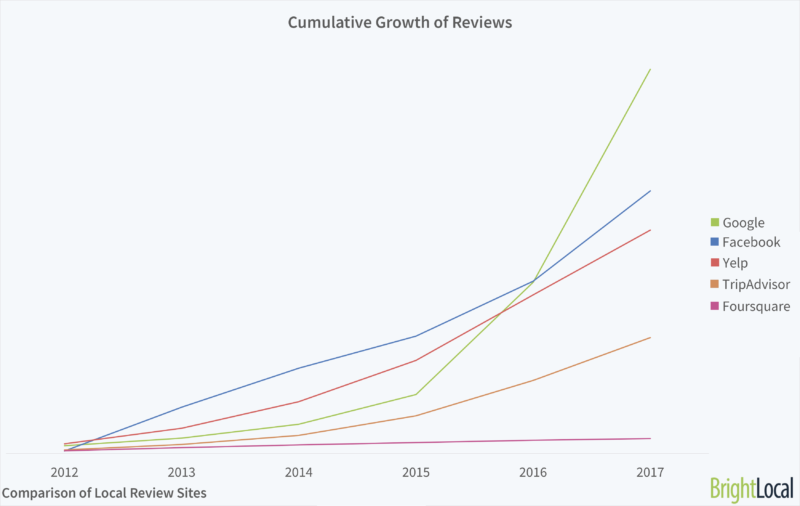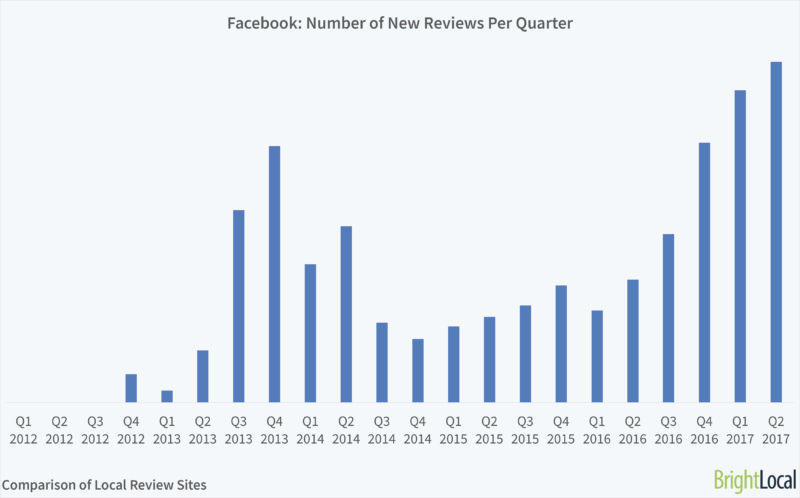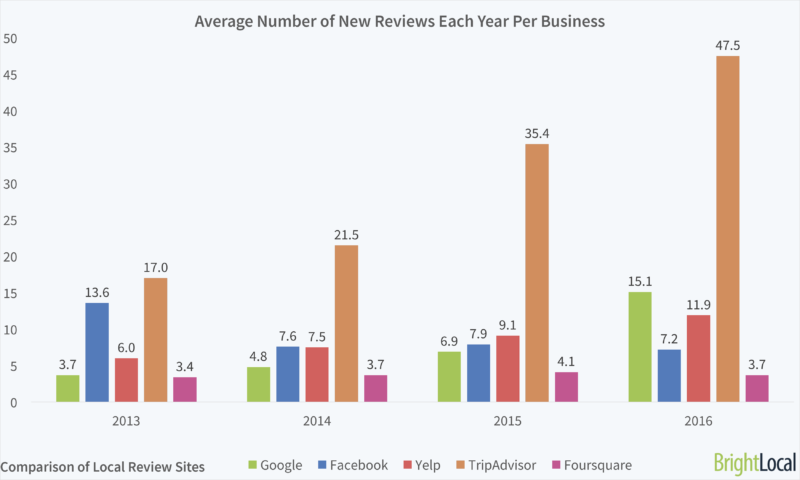Google’s growth in online local reviews continues to dominate, but…
Contributor Jamie Pitman shows us why we should keep an eye on TripAdvisor and Facebook when trying to increase online reviews.

The growing importance of reputation management in business growth needs no introduction. If you want a single statistic to showcase why every business person and their dog encourages great reviews more than ever, it’s this: 85 percent of consumers trust online reviews as much as personal recommendations.
That statistic is from a recent piece of research conducted by my team at BrightLocal. We wanted to see which of the main players in “local” reviews (i.e., reviews for individual businesses rather than global brands or products) was gathering the most reviews, and at what rate.
We started the process by gathering review data from approximately 50,000 US-based businesses using our platform. This aggregated and anonymized data represented a broad sample of local businesses from many different categories.
Then we looked at a few key data points, but primarily at how many reviews each business generated between 2012 and 2017 by review platform.
In 2012, online reviews pretty much became a “thing” for local businesses, and as you’ll see below, it was the year the battle between the review platforms really kicked off.
Google reviews grow
Since the data in this chart reflects our users, we decided to visually illustrate growth trends instead of showing numerical totals.
In a landscape where ratings are visible everywhere — and often more trusted than branded messages from local businesses — it should be no surprise that most of the review platforms have been massively stepping up their game in recent years.
There’s certainly a chicken-and-egg question about whether people trust reviews more these days because they see them more often or whether businesses push for more reviews due to the increasing trust in them, but that’s another subject.
The first thing we can take from this is that Google is the only platform we analyzed that has seen exponential growth in local business reviews submitted to it since inception.
From 2013 to 2014, the number of reviews grew by 80 percent. The next year it grew by 114 percent, and from 2015 to 2016 this growth sped up to an incredible 278 percent.
Why so fast?
I feel there are a number of good reasons for Google’s speed of review growth:
- Google’s sheer scale, visibility and primary purpose as a search engine means every time someone searches for a local business, they’re offered the option to leave a review.
- Google’s native integration into Android devices means that it’s able to get its Google My Business reviews in front of a very large number of smartphone users.
- Google has been significantly pushing for more users to leave reviews, with a notable increase in the number of notifications users receive after frequenting a business.
Since Google is the most visible review ratings system online, business owners today are more inclined to encourage customers to leave reviews on Google than on other platforms. Plenty of business owners will be aware of the significance of good Google My Business ratings on three-pack rankings, too.
Taking a look at the above graph, which shows the growth in Google reviews submitted to businesses in our study on a per-quarter basis, it’s clear the first half of 2016 saw a major push by the platform to gather more reviews.
A similar growth was seen in the first quarter of 2017 as well, so it will be interesting to see if this pattern is repeated in 2018. Perhaps the ubiquity of Google reviews today will lead to a slowing of this growth, but so far, this reviews powerhouse shows no sign of stopping soon.
Facebook local business reviews recover
Of course, Google isn’t the only platform receiving growth in reviews. Facebook, with its encouragement of checking in to local businesses and requesting reviews from users afterward, saw an impressive growth in a similar time period to Google’s reviews explosion in 2016-2017.
Referring back to the first chart in the article on cumulative growth, we can see Facebook benefited from being first out of the gate with online business reviews in 2013 and soon shot to the front of the pack, where it stayed until it was overshadowed in 2017 by Google.
However, after a great start, the number of reviews Facebook gathered per quarter significantly suffered in Q3 2014 and didn’t really start to recover until Q3 2016. We can’t pin down the reasons for this slump, but whatever the reason, it’s clear to see that despite Facebook’s news feed algorithm changes prioritizing non-business posts and the introduction of Facebook Local to host local business pages, it’s managed to regain its momentum.
Our data shows the businesses in our study received 71 percent more reviews on Facebook in 2016 than in 2015.
TripAdvisor is no slouch
The data gathered certainly highlighted the growth of Google and Facebook in recent years, but it’s clear to see in the chart above that TripAdvisor, which focuses on hotels, restaurants and attractions, is no slouch.
In order to assess the average number of new reviews received per business per year, we wanted to compare the platforms fairly, so we looked at the data platform by platform by eliminating all businesses without TripAdvisor listings from the TripAdvisor analysis.
When broken down like this, it’s clear that businesses with TripAdvisor listings receive a much higher average number of new TripAdvisor reviews. In fact, the average business on TripAdvisor received 47.5 new TripAdvisor reviews, triple the number the average business on Google My Business received. This shows that there’s definitely still power in the niche.
Conclusion
When it comes to online local business reviews, Google is killing it, and 2018 could well be the year it leaves its review competitors in the dust.
It’s clear that Google sees a lot of benefit from generating reviews, particularly in instances where a business’s offline hype hasn’t yet transferred to a boosted online presence.
Hopefully, these findings will inspire you to focus your review-generation and reputation-management tactics or reinforce what you’ve seen in your own experience.
Though Google and Facebook are definitely leading the pack on generating local businesses reviews, the findings around TripAdvisor show that it’s important to know your niche and also to generate reviews on your industry-specific platforms.
Contributing authors are invited to create content for Search Engine Land and are chosen for their expertise and contribution to the search community. Our contributors work under the oversight of the editorial staff and contributions are checked for quality and relevance to our readers. The opinions they express are their own.
Related stories
New on Search Engine Land



